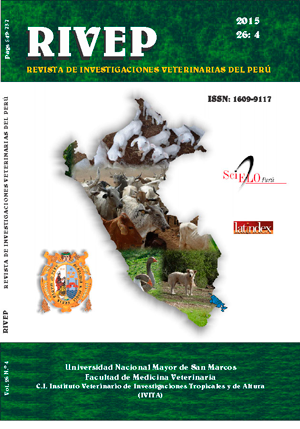Identification of Pathogenic Leptospira Serogroups in Domestic Dogs
DOI:
https://doi.org/10.15381/rivep.v26i4.11221Keywords:
dog, leptospirosis, Leptospira, MAT, serovar, serogroupAbstract
Leptospirosis is an important bacterial zoonosis worldwide. Dogs and other animals can be infected, constituting an important role in the spread of the bacteria to humans. The infection is caused by any of the pathogenic serovars of the 25 serogroups of Leptospira spp. The aim of this study was to identify serogroups of Leptospira spp in dogs that had presumptive diagnosis of leptospirosis. A total of 305 serum samples were obtained from dogs in 31 districts of Lima. The microagglutination test (MAT) was performed, establishing > 1/100 seroreactivity titre as seropositive using reference strains of the 25 serogroups, including the new Iquitos serogroup, Varillal serovar, strain Var10, isolated and reported in human cases in Peru. The frequency of seropositive samples was 58.0% and 10.2% were co-agglutinations. The seropositive reacted against 18 serogroups and the most frequent were: Iquitos (15.1%), Tarassovi (12.1%), Canicola (12.1%), Australis (4.6%), Icterohaemorrhagiae (4.3%), Pomona (3.9%), Mini (3.3%) and Ballum (2.6%). There were no seroreactors to serogroups Bataviae, Celledoni, Hebdomadis, Lousiana, Panama, Ranarum, and Sarmin.Downloads
Downloads
Published
Issue
Section
License
Copyright (c) 2015 Juan Siuce M., Sonia Calle E., Pinto J. Pinto J., Gabriela Pacheco S., Guillermo Salvatierra R.

This work is licensed under a Creative Commons Attribution-NonCommercial-ShareAlike 4.0 International License.
AUTHORS RETAIN THEIR RIGHTS:
a. Authors retain their trade mark rights and patent, and also on any process or procedure described in the article.
b. Authors retain their right to share, copy, distribute, perform and publicly communicate their article (eg, to place their article in an institutional repository or publish it in a book), with an acknowledgment of its initial publication in the Revista de Investigaciones Veterinarias del Perú (RIVEP).
c. Authors retain theirs right to make a subsequent publication of their work, to use the article or any part thereof (eg a compilation of his papers, lecture notes, thesis, or a book), always indicating the source of publication (the originator of the work, journal, volume, number and date).










